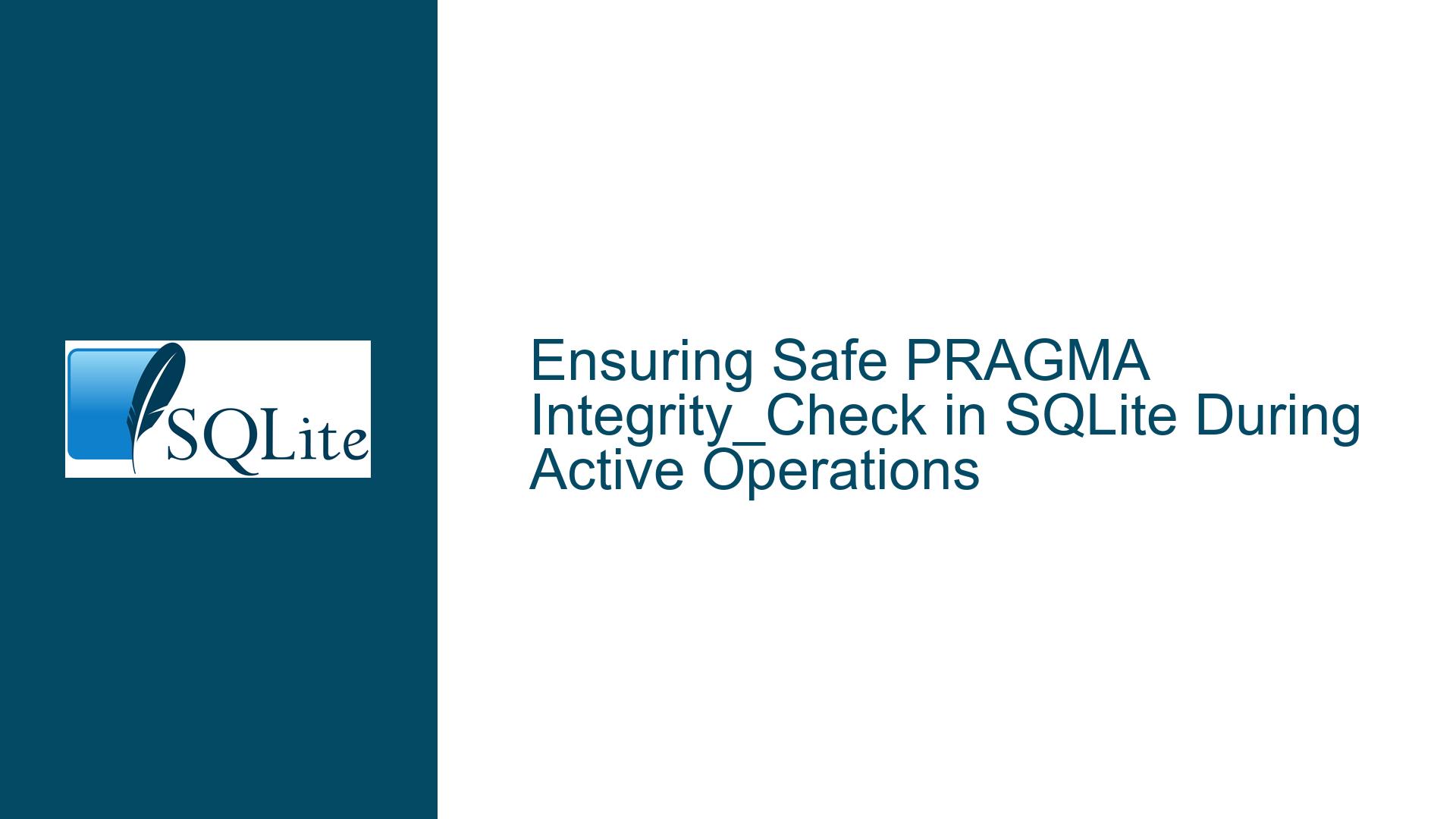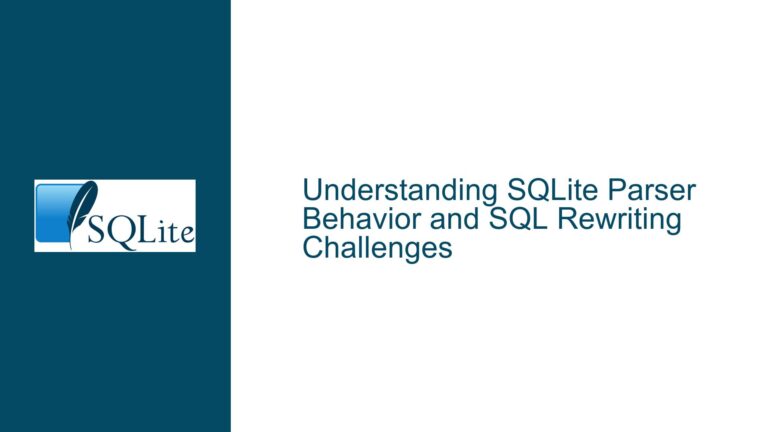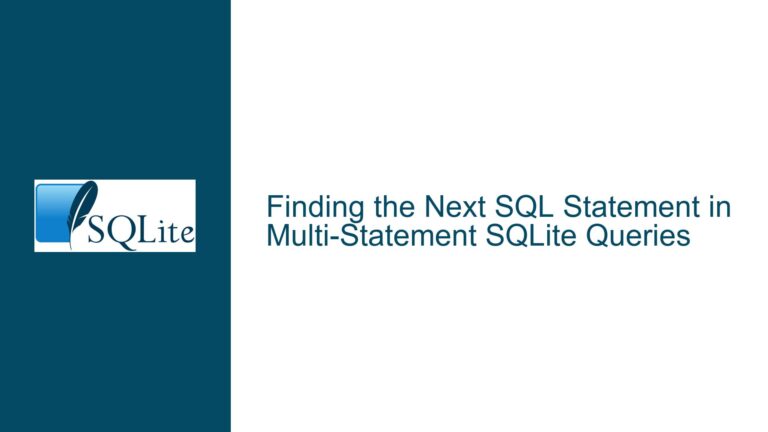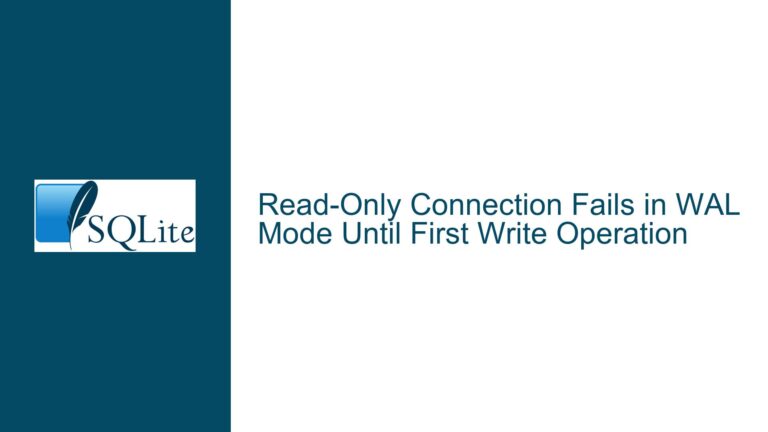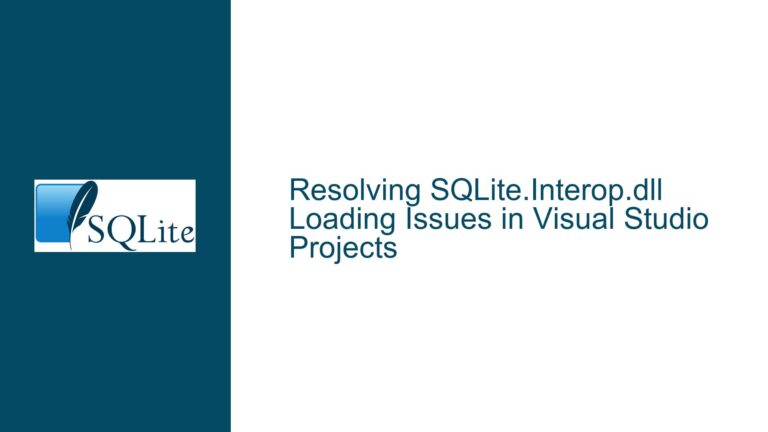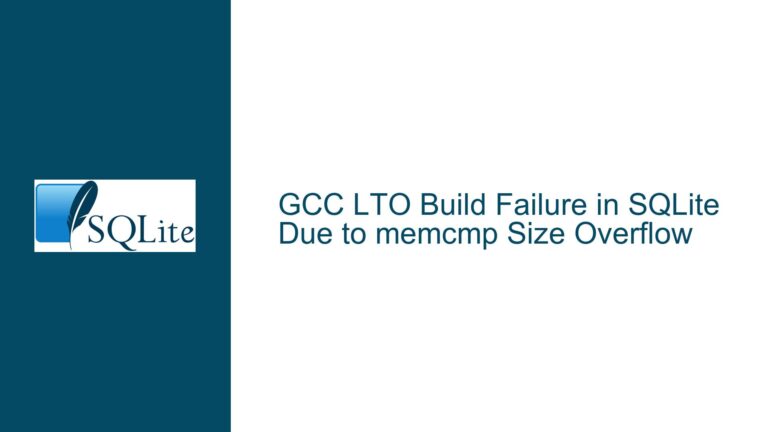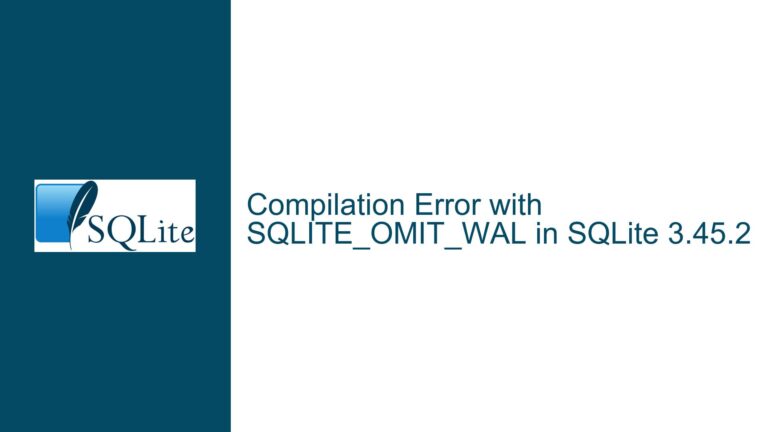Ensuring Safe PRAGMA Integrity_Check in SQLite During Active Operations
Understanding the Impact of PRAGMA Integrity_Check on Concurrent Transactions
PRAGMA integrity_check is a powerful tool in SQLite designed to verify the structural integrity of a database. It scans the entire database to ensure that indices, tables, and other components are free from corruption. However, its interaction with concurrent write operations can lead to complications, especially when the database is not operating in WAL (Write-Ahead Logging) mode.
When PRAGMA integrity_check is executed, it initiates a read transaction. In rollback journal mode (the default mode in SQLite), read transactions can block write transactions, and vice versa. This mutual exclusivity arises because SQLite’s rollback journal mode uses a single writer model, where only one write operation can occur at a time, and read operations are blocked during writes. Similarly, write operations are blocked during read transactions, such as those initiated by PRAGMA integrity_check.
The primary concern is that if a write operation is attempted while PRAGMA integrity_check is running, the write operation will fail with an SQLITE_BUSY error. This error indicates that the database is temporarily unavailable for writing due to an ongoing read transaction. While this does not directly cause database corruption, it can disrupt application functionality, particularly in high-concurrency environments where write operations are frequent.
Furthermore, the output of PRAGMA integrity_check itself can be affected by concurrent write operations. If a write operation modifies the database while the integrity check is in progress, the check might report inconsistencies that do not reflect actual corruption but rather the transient state of the database during the write operation. This can lead to false positives, making it difficult to diagnose genuine integrity issues.
In summary, PRAGMA integrity_check is a valuable tool for maintaining database health, but its use during active database operations requires careful consideration. The interaction between read and write transactions in rollback journal mode can lead to SQLITE_BUSY errors and potentially misleading integrity check results. Understanding these dynamics is crucial for implementing effective database maintenance strategies.
Exploring the Consequences of Concurrent Writes and Integrity Checks
The consequences of running PRAGMA integrity_check concurrently with write operations depend largely on the database’s journaling mode and the application’s handling of SQLITE_BUSY errors. In rollback journal mode, the primary issue is the potential for SQLITE_BUSY errors, which occur when a write operation is attempted while a read transaction is in progress. These errors can disrupt application functionality, particularly in scenarios where write operations are time-sensitive or critical to business processes.
One possible consequence is that the application might fail to complete important transactions, leading to data inconsistencies or loss of user data. For example, if an e-commerce application attempts to process an order while PRAGMA integrity_check is running, the order might not be recorded, resulting in a poor user experience and potential revenue loss. Additionally, frequent SQLITE_BUSY errors can degrade application performance, as the application must repeatedly retry failed write operations or handle errors gracefully.
Another consequence is the potential for misleading results from PRAGMA integrity_check. If a write operation modifies the database while the integrity check is in progress, the check might report inconsistencies that do not reflect actual corruption. For instance, if a table is being updated while the integrity check is scanning it, the check might flag the table as corrupted due to the transient state of the data. This can lead to unnecessary panic and troubleshooting efforts, diverting resources from more pressing issues.
In WAL mode, these issues are mitigated to a significant extent. WAL mode allows concurrent read and write operations by using a separate write-ahead log file. This means that PRAGMA integrity_check can run concurrently with write operations without causing SQLITE_BUSY errors. However, WAL mode is not always an option, particularly in environments where it is not supported or where switching journaling modes is impractical.
For applications that cannot use WAL mode, the consequences of concurrent writes and integrity checks must be carefully managed. This might involve scheduling integrity checks during periods of low activity, implementing retry logic for write operations, or using other strategies to minimize the impact of SQLITE_BUSY errors. Understanding these consequences is essential for maintaining database integrity while ensuring smooth application operation.
Strategies for Safely Running PRAGMA Integrity_Check in Active Environments
To safely run PRAGMA integrity_check in environments where the database is actively used, several strategies can be employed. These strategies aim to minimize the impact of SQLITE_BUSY errors and ensure that integrity checks provide accurate results without disrupting application functionality.
One approach is to schedule PRAGMA integrity_check during periods of low database activity. For example, if the application experiences a lull in user activity during certain hours, such as late at night, this can be an ideal time to run the integrity check. By aligning the check with periods of low activity, the risk of SQLITE_BUSY errors is significantly reduced, and the integrity check can complete without interference from write operations.
Another strategy is to implement a retry mechanism for write operations. When a write operation encounters an SQLITE_BUSY error, the application can wait for a short period and then retry the operation. This approach can be combined with setting a busy_timeout using PRAGMA busy_timeout=N, where N is the number of milliseconds the application should wait before retrying the operation. By configuring an appropriate busy_timeout, the application can handle transient SQLITE_BUSY errors gracefully, reducing the likelihood of failed transactions.
For applications that cannot switch to WAL mode or adjust their busy_timeout, an alternative is to temporarily pause write operations while PRAGMA integrity_check is running. This can be achieved by implementing a locking mechanism or using application-level logic to queue write operations until the integrity check is complete. While this approach requires careful implementation to avoid deadlocks or excessive delays, it can ensure that the integrity check runs smoothly without interference from write operations.
In addition to these strategies, it is important to monitor the results of PRAGMA integrity_check and investigate any reported inconsistencies. If the integrity check flags potential issues, further analysis should be conducted to determine whether the issues are genuine or the result of transient states during write operations. This might involve running the integrity check multiple times or using additional diagnostic tools to verify the database’s health.
Finally, regular database maintenance, such as vacuuming and reindexing, can help prevent corruption and reduce the need for frequent integrity checks. By maintaining a healthy database environment, the risk of encountering integrity issues is minimized, and the impact of running PRAGMA integrity_check is further reduced.
In conclusion, safely running PRAGMA integrity_check in active environments requires a combination of scheduling, retry mechanisms, and careful monitoring. By implementing these strategies, database administrators can ensure that integrity checks provide accurate results without disrupting application functionality. Understanding the nuances of SQLite’s transaction model and the interaction between read and write operations is key to maintaining a robust and reliable database system.
